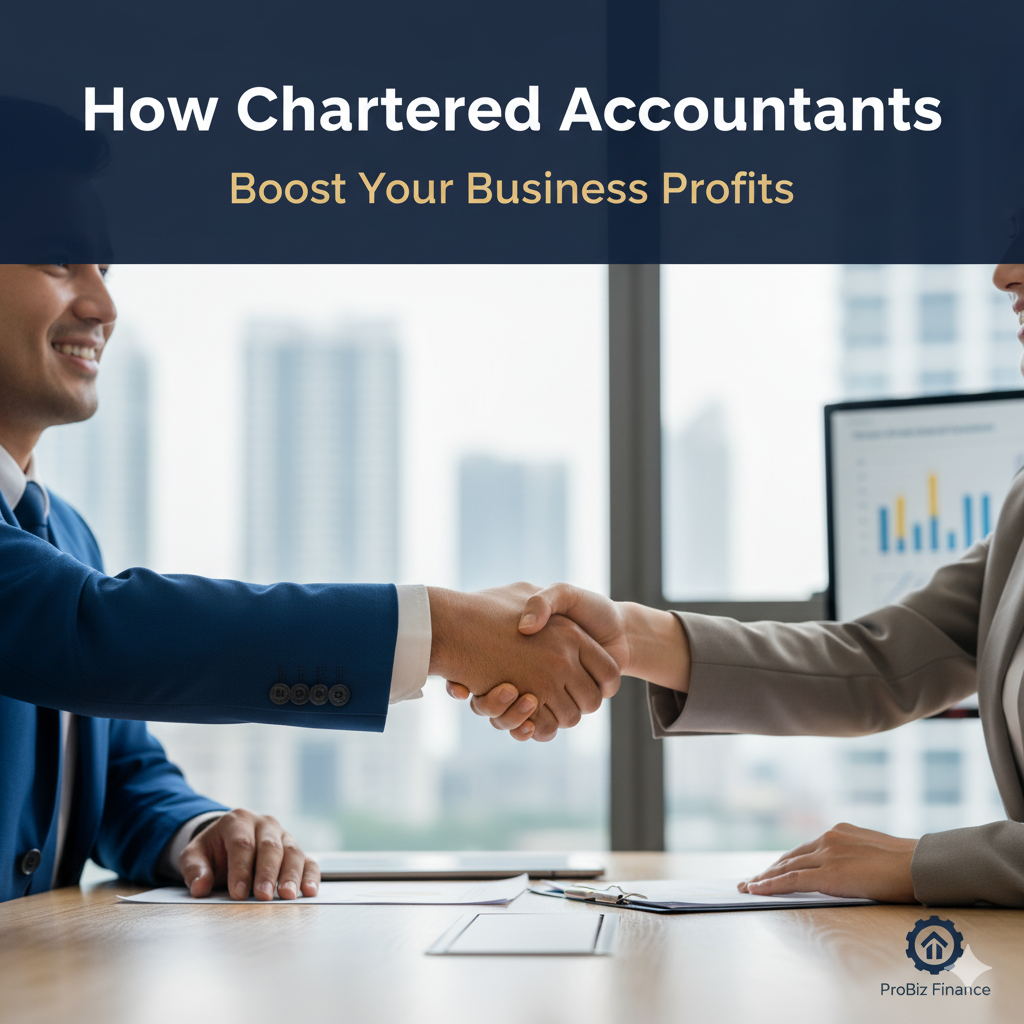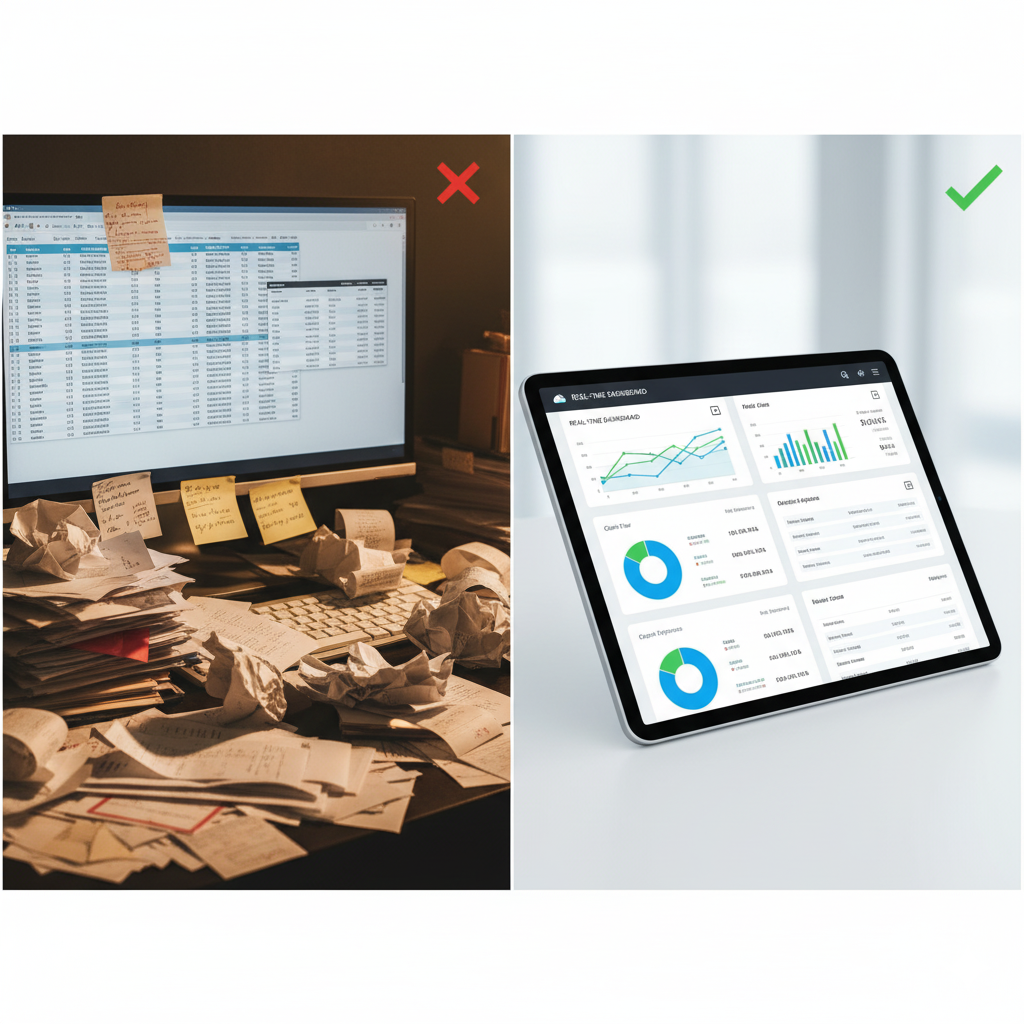
Here’s something most business owners get backwards: they think accountants are the people you hire when you’ve already made money. File the taxes, tick the compliance boxes, maybe get a pat on the head if you’ve been “good” with your record-keeping.
Wrong.
A proper chartered accountant firm should be making you money, not just recording what you’ve earned. If yours isn’t doing that, you’re essentially paying someone to drive whilst looking in the rearview mirror. And yes, I’ve seen businesses do exactly this for years—wondering why they’re stuck in the same revenue bracket whilst their competitors seem to effortlessly scale.
The difference? Those competitors found accountants who actually understand business strategy. Not just tax codes.
Why Most Businesses Leave Money on the Table (And Don’t Even Know It)
Walk into any high-street business and ask the owner how much tax they paid last year. They’ll tell you. Ask them how much tax they could have avoided legally, and you’ll get blank stares.
That gap? That’s where a chartered accountant firm earns its keep.
I’m talking about inheritance tax planning that protects family wealth for generations, CIS claims and refunds that construction businesses perpetually miss, and tax advisory solutions that go beyond “here’s your bill.” When Ask Accountant works with clients at 178 Merton High St, London SW19 1AY, the first conversation isn’t about compliance—it’s about opportunity.
Because compliance is the baseline. A driving licence doesn’t make you Lewis Hamilton.
The Three Profit Levers Your Accountant Should Be Pulling
Let’s get tactical. A genuinely useful chartered accountant firm manipulates three core levers:
1. Tax Efficiency: The Obvious One Everyone Botches
You know those entrepreneurs who brag about their “write-offs”? Half of them are committing tax fraud without realising it, and the other half are leaving legitimate savings on the table because they’ve never had proper guidance.
Real tax advisory isn’t about aggressive schemes. It’s about structure. Should you operate as a sole trader or limited company? When should you extract profits as dividends versus salary? What expenses can you actually claim without an HMRC investigation landing on your desk?
These questions have specific answers that change based on your revenue, your industry, and your personal circumstances. A chartered accountant firm worth its salt knows this. They’re not giving you generic advice copied from a blog (oh, the irony).
2. Cash Flow Management: The Unsexy Thing That Kills Businesses
Profit is an opinion. Cash is a fact.
I’ll say it again for the people in the back: profit is an opinion, cash is a fact.
You can be “profitable” on paper whilst your business account shows £347 and you’re choosing between paying yourself and paying your supplier. This happens more than you think. Especially in businesses with long payment cycles or seasonal fluctuations.
Business accounting services should include forward-looking cash flow forecasting. Not just “here’s what happened last quarter” but “here’s what’s coming in three months, and here’s how we’ll handle the gap.” That’s the difference between reactive bookkeeping and proactive financial management.
| Service Type | Reactive Approach | Proactive Approach | Typical ROI |
| Tax Planning | File returns, pay bill | Structure optimisation, timing strategies | 15-30% savings |
| Bookkeeping | Record transactions monthly | Real-time insights, expense tracking | 10-20 hours saved/month |
| Business Advisory | Annual review meetings | Quarterly strategy sessions, KPI monitoring | 20-40% profit increase |
| Cash Flow | Check bank balance | 13-week rolling forecasts | Eliminates 90% of cash crises |

3. Strategic Planning: Where The Real Money Lives
This is where small business accounting services transform into genuine business partnership. Should you hire two part-timers or one full-timer? Is that equipment purchase better as an outright buy or lease? When’s the right time to expand into a second location?
These aren’t obviously accounting questions on the surface, but the answers are buried in your numbers. And a chartered accountant firm that understands business growth planning can model these scenarios for you. Not with gut feeling—with actual data.
Which, let’s be honest, is more useful than “mate of mine did it this way and it worked out alright.”
The Hidden Costs of a “Cheap” Accountant
I once met a café owner who was paying £95 a month for her accountant. Seemed like a bargain until we discovered she’d been paying 40% more tax than necessary for three years because her structure was wrong. That “bargain” cost her roughly £18,000.
(And yes, she switched accountants immediately. Better late than never, I suppose.)
Cheap accountants aren’t expensive because of their fees. They’re expensive because of what they don’t do.
They won’t tell you about:
- Auto-enrolment pension schemes that reduce your tax bill whilst keeping employees happy
- R&D tax credits (yes, even small businesses can claim these)
- Capital allowances on property purchases that most people never claim
- VAT schemes that could save you thousands annually
Why? Because identifying these opportunities requires actual work. Analysis. Strategic thinking. Not just data entry and tax return submission.
What “Proactive Tax Advisory” Actually Means in Practice
Let’s decode this phrase because it gets thrown around like confetti at a wedding.
Proactive means your accountant contacts you before year-end saying: “Based on your current trajectory, you’ll hit the next tax bracket in November. Here are three strategies to consider.” It means they’re monitoring legislative changes and telling you how they affect your specific situation.
It definitely doesn’t mean you chase them for six weeks to get last year’s accounts filed. (If that’s your reality right now, I’m sorry. But also—you know what you need to do.)
When you work with a chartered accountant firm that takes tax advisory seriously, you get:
- Regular tax health checks – Not just annual, but quarterly reviews of your position
- Scenario planning – “If we do X, your tax will be Y” before you commit
- Deadline management – They remind you, not vice versa
- Strategic timing advice – When to make purchases, extract profits, or defer income
| Business Stage | Key Accounting Focus | Common Mistakes to Avoid |
| Startup (Year 1-2) | Structure setup, expense tracking, basic bookkeeping | Wrong legal structure, missing receipts, no separation of personal/business finances |
| Growth Phase (Year 3-5) | Cash flow forecasting, tax optimisation, hiring strategy, VAT | Ignoring cash flow, reactive tax planning, no budget |
| Established (5+ years) | Business advisory, succession planning, wealth protection | Complacency, outdated structure, no exit strategy, assuming “it’s fine” |
| Scaling/Exiting | Due diligence preparation, valuation maximisation, tax-efficient exit planning | Last-minute prep, poor records, unexpected tax bills |
From Business Advice to Business Transformation
The best chartered accountant firm relationships don’t feel like vendor-client arrangements. They feel like partnerships.
Your accountant should know your business almost as well as you do. They should understand your industry’s seasonality, your customer payment patterns, your margin pressures. When you mention you’re thinking about a new product line, they should immediately start modelling the financial impact.
That’s not accounting. That’s business advice. And it’s what separates firms that add genuine value from those that just process numbers.

The ROI Question: Calculating the True Value of Your Accountant
Right, let’s talk money.
A decent chartered accountant firm should generate returns that dwarf their fees. Here’s a realistic example (based on an actual client, though I’ve simplified the numbers):
- Annual accounting fee: £3,000
- Tax savings identified: £7,500
- Time saved on admin: 200 hours × £50/hour = £10,000
- Bad decision avoided: £15,000 (e.g., wrong expansion timing)
- Total value: £32,500
- Net benefit: £29,500
That’s a 10x return. Yet most business owners never calculate this because they see accounting as a cost centre, not an investment. Which is backwards, honestly.
(If your accountant isn’t generating at least 3x their fees in value, you’re with the wrong firm. Full stop.)
Red Flags: Is Your Accountant Holding You Back?
Not all chartered accountant firms are created equal. Some warning signs:
- You initiate every conversation
- They take weeks to respond to simple questions
- They’ve never proactively suggested a tax saving strategy
- Their advice is always “it depends” without actual analysis
- They don’t understand your industry at all
- Annual meetings feel like interrogations, not collaborations
If three or more of these apply, it’s time for a conversation. Or a new accountant.
Accounting and Bookkeeping: The Foundation No One Gets Excited About
Let’s be honest—bookkeeping is boring. Tedious. About as thrilling as watching paint dry in slow motion.
But here’s the thing: it’s the foundation everything else sits on. Bad bookkeeping means bad data. Bad data means bad decisions. Bad decisions mean… well, you get it.
When Ask Accountant (contact them on +44(0)20 8543 1991 if you’re curious) talks about accounting and bookkeeping services, they’re really talking about building an information system that tells you the truth about your business. In real-time, not six months after the fact when you can’t actually do anything about it.
Cloud accounting has made this infinitely easier, by the way. If your accountant still wants everything on spreadsheets emailed monthly, that’s a red flag the size of Wales. We’re not living in 2005 anymore.

A Gold Mine for Construction Businesses: CIS Claims
Quick tangent for construction firms (because too many of you are leaving money on the ground):
CIS claims and refunds are consistently under-claimed. The Construction Industry Scheme deducts tax at source, but many subcontractors overpay because they don’t claim all their allowable expenses or don’t understand gross payment status. It’s frustrating to watch, really.
A specialist chartered accountant firm that understands construction can often recover thousands in the first year alone. Multiply that by every year you’ve been overpaying…
Yeah. That’s real money. Not theoretical savings—actual cash back.
The Auto-Enrolment Paradox: Trap or Tax Opportunity?
Auto-enrolment pensions feel like a bureaucratic headache. Forms, contributions, compliance obligations.
But—and this is important—they’re also a tax-efficient way to extract money from your business. Employer pension contributions reduce your corporation tax whilst building retirement wealth outside your estate for inheritance tax purposes.
A smart chartered accountant firm helps you structure this optimally. Not just “meet the minimum requirements” but “use this to your maximum advantage.”
Beyond the Basics: Small Business Accounting That Scales With You
Here’s a mistake I see repeatedly: businesses outgrow their accountant but don’t realise it until they’re in crisis.
Your accounting needs when you’re a solo operator are completely different from when you have 10 employees, £500K turnover, and expansion plans. Small business accounting services should evolve:
- Phase 1: Basic bookkeeping, tax returns, structure advice
- Phase 2: Cash flow management, VAT optimisation, growth planning
- Phase 3: Strategic advisory, scenario modelling, wealth protection
- Phase 4: Exit planning, succession strategy, legacy structuring
If your accountant can only do Phase 1, you’ll need to switch firms as you grow. Unless you find one that scales with you from the start. (Which, hint, is why business growth planning should be part of the conversation from day one.)
Securing Your Legacy: How Inheritance Tax Planning Saves Generational Wealth
This is where accounting becomes genuinely life-changing.
Inheritance tax at 40% can decimate family wealth. I’ve seen businesses built over 30 years sold at fire-sale prices to pay the tax bill when the founder dies. Their kids get a fraction of what they should have inherited.
All preventable.
A chartered accountant firm that understands inheritance tax can structure business ownership, use trusts effectively, and implement strategies that protect wealth across generations. This isn’t just for millionaires—if your business is worth £325,000+, this affects you.
The Conversation That Matters: Asking the Right Questions
Stop asking “How much do you charge?”
Start asking:
- “How will you help me make more money?”
- “What’s your process for identifying tax savings?”
- “How often will we review my financial strategy?”
- “What industries do you specialise in?”
- “Can you show me examples of value you’ve added for similar businesses?”
The answers will tell you everything you need to know. A good accountant won’t just answer—they’ll get excited. Because these are the questions that separate order-takers from strategic partners.
Why Location Still Matters in a Digital Age (Sort Of)
In theory, cloud accounting means your chartered accountant firm could be anywhere. In practice, having someone local often helps—especially for face-to-face strategy sessions or when you need to drop off documents urgently.
But don’t sacrifice quality for proximity. A brilliant accountant two hours away beats a mediocre one down the street. Though if you can find both (like firms in accessible London locations), that’s ideal.
Making the Switch: It’s Easier Than You Think
If you’re reading this thinking “my accountant doesn’t do any of this,” you’re probably wondering how difficult it is to switch.
Honestly? Less painful than staying with the wrong firm.
Most chartered accountant firms will handle the transition. They’ll request your files from your current accountant, review everything, and identify immediate opportunities. The handover usually takes 2-4 weeks.
The bigger question: what’s the cost of not switching? Every month you delay is another month of missed tax savings, poor advice, and strategic opportunities left untapped.
The Bottom Line: Your Accountant Should Be an Investment, Not a Cost
Your accountant should make you money. Not just count it, not just comply with regulations—actually, measurably make you wealthier.
If they’re not doing that, you’re paying for the wrong service. Simple as.
A proper chartered accountant firm combines tax expertise, business insight, strategic planning, and proactive service. They anticipate problems, identify opportunities, and help you navigate the financial complexity of running a business without making you feel like an idiot for asking “basic” questions. (There are no basic questions when it comes to tax, by the way.)
That’s not accounting. That’s partnership. And it’s the difference between businesses that stagnate and those that scale.
If you’re in London and want to have this conversation properly, Ask Accountant specialises in exactly this approach. Give them a ring on +44(0)20 8543 1991 or visit them at 178 Merton High St, London SW19 1AY. They’ll start by understanding where you are, where you want to go, and what’s currently stopping you.
Because the goal isn’t just better accounting. It’s a better business. And honestly? You deserve both.
Frequently Asked Questions
What do you think I should pay a chartered accountant firm?
Depending on the complexity and the level of service, fees are extremely different. Basic compliance could begin with as little as £1500-2500 a year on small businesses whereas full-service advisory services may cost between 3000-10000 or even more. It is not a question of how much but what is the payback. The value of a good firm should yield no less than 3-5 times of their fees.
What is there to distinguish between a bookkeeper and a chartered accountant?
Bookkeepers write down the transactions- they are smart at having your financial records up to date. Chartered accountants do the analysis of those records, offer tax planning, strategic and business advisory services. Consider it as two types of mechanic; one who will change your oil and the other who can rebuild your engine and show an increase in its performance.
How frequently do I need to meet my accountant?
At minimum, quarterly. Growing businesses is better attached to monthly. When you see your advisor once a year at tax time, you are not having strategic value, you are getting compliance processing. Proactive planning is possible through frequent touchpoints as opposed to reactive fire fighting.
Will a chartered accountant actually help me to get out of tax?
Absolutely. Tax evasion (illegal) is entirely different to tax avoidance (legal). The strategic organization, timing choices, allowance claims and planning can very easily save you a lot of tax under the law. Most businesses overpay simply because they don’t know what’s available.
When should I switch from a basic accountant to a chartered accountant firm?
When you start asking strategic questions your current accountant can’t answer. When your turnover exceeds £100K. When you’re hiring employees. When you’re considering expansion. Or immediately if you’re getting zero proactive advice from your current provider.







